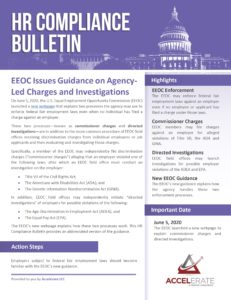On June 5, 2020, the U.S. Equal Employment Opportunity Commission (EEOC) launched a new webpage that explains two processes the agency may use to enforce federal fair employment laws even when no individual has filed a charge against an employer.
These two processes—known as commissioner charges and directed investigations—are in addition to the more common procedure of EEOC field offices receiving discrimination charges from individual employees or job applicants and then evaluating and investigating those charges.
Specifically, a member of the EEOC may independently file discrimination charges (“commissioner charges”) alleging that an employer violated one of the following laws, after which an EEOC field office must conduct an investigation on the employer:
- Title VII of the Civil Rights Act;
- The Americans with Disabilities Act (ADA); and
- The Genetic Information Nondiscrimination Act (GINA).
In addition, EEOC field offices may independently initiate “directed investigations” of employers for possible violations of the following:
- The Age Discrimination in Employment Act (ADEA); and
- The Equal Pay Act (EPA).
The EEOC’s new webpage explains how these two processes work. This HR Compliance Bulletin provides an abbreviated version of the guidance.
This Compliance Bulletin is not intended to be exhaustive nor should any discussion or opinions be construed as legal advice. Readers should contact legal counsel for legal advice. ©2020 Zywave, Inc. All rights reserved.
For More:


